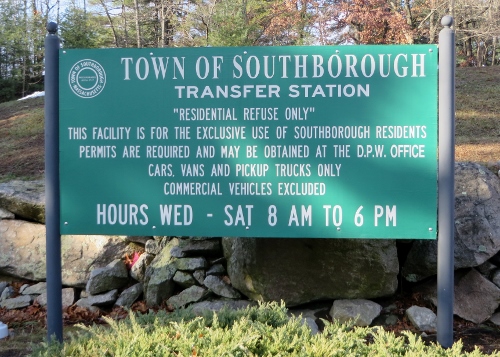Above: The Select Board will vote next week on how much of the Transfer Station operations should be subsidized by taxpayers vs covered by users, and how much senior residents should have to pay. (photo by Beth Melo)
Last week, the Select Board discussed potential changes to permit fees for using the Transfer Station. The board will hold a hearing on the changes this Tuesday night, June 20th, before casting votes that night.
The board is seeking to decrease the costs covered by taxes by increasing the amount collected in user fees. That could be through a simple fee increase. But the board is considering eliminating the free stickers provided to seniors.
As members have changed over the last decade, there have be recurring debates on the board about how much of the Transfer Station costs should be covered by taxes verses permit fees. For background on the history and the fiscal situation, scroll down.
On June 12th, the board discussed the desire to reduce the amount of taxes covering the operations. They referred to the fact that some residents use private haulers, (including member Al Hamilton).
Chair Andrew Dennington referred to a past report by resident John Butler who studied the Transfer Station situation and options. He had warned of the need to balance fees, to keep too many users from switching to private haulers. Dennington reminded that a big reduction in users would decrease the revenue raised by stickers that year, causing a downward spiral.
Figures provided showed that fully covering costs through fees would require increasing permit fees under the current structure from $260 to $344.40.
Given that estimates for private haulers were referred to as $400-$600, member Marguerite Landry worried that increase would push a number of residents to decide that paying the extra cost was worth the increased convenience.
The estimate assumed that seniors would continue to receive their permits for free. That was something that member Kathy Cook argued against, with apparent support from all or most of the board.
Cook called for charging seniors, but with a discounted fee. She indicated that many seniors in town are well off, and those with financial difficulties can apply for the fee waiver.* And she highlighted that seniors are a growing population in town (including herself and three fellow board’s members).
Town Administrator Mark Purple estimated that a $50 fee for seniors would mean that non-seniors permits would only have to increase to $323 to cover all Transfer Station costs.
Member Sam Stivers pushed for still covering $100K of the fees with taxes. He estimated that could be done by charging $260 per non-senior with $20 per additional sticker, and $50 per senior with $10 per additional sticker.
There was some debate about whether residents should be charged for additional stickers.
In the end, the board asked for Purple to come back on June 20th with a few pricing options and financial impacts. They planned to post a hearing on the issue. The decision will be effective July 1st. (Current stickers expire on September 15th.)
The Hearing has been posted for 6:30 pm on Tuesday night. You can attend to comment in person at the Town House or over zoom. (Click here for the agenda.) You can also email the board or post a comment on this blog (here) responding to Hamilton’s request for feedback. (But don’t wait until too late on Tuesday, or he may not see it.)
More Context
Over the years, some board members have argued that the station should be fully funded by users. Others have supported a recommendation twice made by the Public Works Planning Board (in 2015 & 2019) to consider it a public service and eliminate fees. The continuous compromise has been to have permit fees cover “disposal costs” and only a portion of the “operating costs”.
The packet for the Select Board’s June 12th discussion included options for fully covering the cost through permit fees — an approach supported by Cook. But the board discussion leaned towards continuing the past approach, simply decreasing the amount covered by taxes.
Members noted that over the years, keeping fees down has led to increased tax subsidies. They referred to a past consensus that $100K should be covered by taxes, but had grown to over $186K for FY23.
They noted that the cost of disposal has been impacted by going from being paid for recycling to having to pay more to recycle materials than for disposing of trash dumped in the hopper.
In comparing the figures to those presented in 2013, the calculated operating costs (personnel, etc) has grown less than 10% in 10 years, while disposal costs increased 20%. And the costs covered by taxes has increased 210% since FY14.
The packet for the June 12th meeting also included figures for the “Pay as You Throw” approach. It wasn’t discussed as an option members were considering that night. It is a method that some officials have advocated for in the past (both for fairness and to encourage residents to reduce waste). But it has never gained majority support of the board.
*Using a confidential application, residents can apply for a waiver to fees if they have “an inability to pay or an extreme hardship”.


